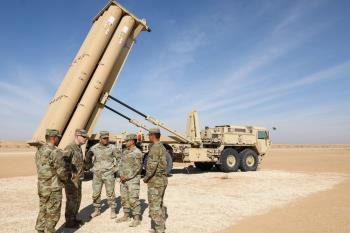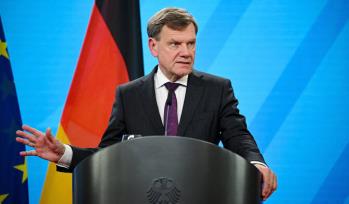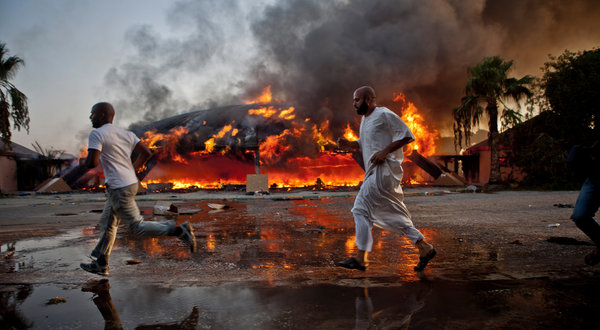Alwaght- Egyptian authorities announced that Egypt has launched air strikes in Libya against ISIS's headquarters after the terrorist group released a video showing the beheading of 21 Egyptian Christians.
The Egyptian state television aired images of aircrafts taking off from the airbases to strike ISIS targets, and broadcasted the army’s announcement concerning this incident.
"Your (Egyptian people) armed forces on Monday carried out focused air strikes in Libya against Daesh [ISIS] camps, places of gathering and training, and weapons depots," the military said in a statement.
The airstrikes came shortly after Abdel Fattah Al Sisi, Eypt’s President, televised address to the nation, promising strong retaliation against the terrorists. "Egypt and the whole world are in a fierce battle with extremist groups carrying extremist ideology and sharing the same goals, and Egypt reserves the right to respond in a suitable way and time to punish these murderers."" said the Egyptian president.
Over the weekend, ISIS had release a video that shows the beheading of 21 Egyptian Christians. The victims were kidnapped from the coastal town of Sirte in eastern Libya, which now is under the control of terrorists.
The caption of the video remarked: "The people of the cross, followers of the hostile Egyptian church". The creators identify themselves as the Tripoli Province of the ISIS.
On Friday, ISIS released pictures of the kidnapped Egyptians, saying they had been abducted to retaliate the fate of Muslim women "tortured and murdered by the Coptic church of Egypt". After the incident of abduction, ISIS magazine “Dapiq” claimed that Cairo plans to evacuate Egyptians from Libya.
Following Egypt’s airstrikes on Libyan borders, the Libyan army has also requested Egyptian aerial bombardments in Libya, not just against ISIS terrorist group, but also against other opposing militias.
"We strongly support Egyptian military intervention to strike Daesh and other terrorist groups. Libyans are helping the Egyptian army to take revenge on these terrorist forces because Cairo is considered to be a Libyan city," said Libya's top army general Khalifa Haftar.
Since he toppled the Islamist President Mohammad Mursi and seized power, Abdel Fattah Al Sisi follows the Saudi agenda. His victory in the presidential elections on May 2014 was a symbol of the Saudi Monarchy’s success in turning back what it labelled as “strange chaos” following revolutionary wave of demonstrations and protests known as the Islamic Awakening.
Saudi Arabia always feared the empowerment of Muslim Brotherhood in the region. The movement is influential in Jordan, the Monarchy’s northern neighbor, and in Yemen, its southern neighbor. Saudi leaders feared that growing guidance of Muslim Brotherhood of Hamas in Gaza Strip could create the “Brotherhood Crescent” to the North, South and West of the Kingdom.
This fear stems from their realization that the Muslim Brotherhood movement form an Islamic state in the region, that may motivate Saudi nation too. Therefore, Saudi political-religious elites pushed former defense minister Abdel Fattah Al Sisi to topple the only existing Muslim Brotherhood regime at that time, and oppress the movement’s supporters in Egypt.
In Libya, Saudi Arabia is attempting to form an international coalition including America and France, as well as Egypt and the UAE to overturn the government in Libya before the Libyan Muslim Brotherhood, backed by Qatar and Turkey, takes over the government. Therefore, the Saudi monarchy is pushing Al Sisi to provide anti-Islam militias lead by General Khalifa Haftar. This support could could be a direct intervention, providing aerial support to militias on the ground or relying on providing allied militias with weapons and logistical support.
Moreover, Various news have discussed the possibility that a Persian Gulf state might finance a French or Egyptian military campaign to attack the Islamist battalions in Libya, especially those affiliated with the Muslim Brotherhood, even if the bill for the campaign reaches into the tens of billions. Although it denied any intervention in Libya, Egypt seems to be the most enthusiastic to launch military operations against the armed Islamist battalions. This eagerness stems from Egypt’s aim to prove that it is still one of the leading countries in North Africa and in the Arab world. Nevertheless, what al-Sisi is missing is the economic struggle Cairo is facing, and thousands of Egyptians residing Tripoli the capital of Libya.
Libya has been in chaos ever since the 2011 overthrow of former dictator Muammar Gaddafi. A number of radical groups have been active in the country, some of them declared allegiance to the ISIS, and Libyans were fighting a proxy war on behalf of Saudi Arabia, Egypt from one side, and Turkey and Qatar from the other side.



























